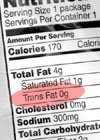Avoiding trans fatty acids in Japan

I got a few questions about trans fats and how to avoid them. Dr. Oshimi Takayuki in the city of Ashikawa, Hokkaido, has written about this topic Here's a buzzword for you: Trans Fat. Here is an excerpt:
Why isn't there any legislation regarding the labelling of trans fats in Japan? The risk of developing an artery-clogging disease depends on one's level of intake of saturated fats. In general, Japanese people consume far fewer saturated fats than western people. So, many food manufacturers insist they don't need to worry about the level of trans fats. But the [U.S.] Food and Drug Administration (FDA) says that trans fats provide no known health benefits, so there is no safe level of trans fats, and people should consume as little as possible in order to maintain a healthy diet. With the level of trans fat in your food being undeterminable, what is there to do? Well, here are a few tips:
* Choose reduced fat and fat-free products whenever you can
* Avoid margarine
* Avoid foods containing plant oils (植物油)
* Avoid packaged foods
* Avoid fast food
* Avoid baked goods
* Avoid candy and cookies
* Avoid cereals
Feel you can't eat anything? No! You are now in Japan! Traditional Japanese foods don't contain these ingredients.
加工油脂 (Processed oil or fat) is another ingredient to avoid.
マーガリン (Margarine) is not a food, it is soap with added artificial butter flavours and other chemicals.
植物油 (Plant oils) Many plant oils such as sesame oil, olive oil or canola are of course healthy, but the oils should not be heated or processed in any way. That is the reason "virgin olive oil" is recommended since it is cold pressed in a slow and unobtrusive way that doesn't destroy the fat molecules. Unfortunately, without a trans fat label, you have no idea about the amounts that you get in your Japanese food. Bummer! I also try to avoid deep fried foods because there is no way to know if the cook is using the right temperature. Deep frying has been shown to produce acrylamides, a toxic compound.
In Japan, food oils that come from genetically modified organisms are not labelled. That's why I prefer oils from crops that are not GMOs, such as olive and sun flower, as well as avocado oil, walnut oil, and rice oil.
Living Healthy in Ashikawa is a monthly column in the newsletter which is called "Asahikawa Info." It is one of the nicest newsletters I have seen in Japan! Congratulations on an inspiring initiative that other Japanese towns ought to consider as well.
Trans fats previous

Comments
Good post.
==================================
Roger
Handmade Soap